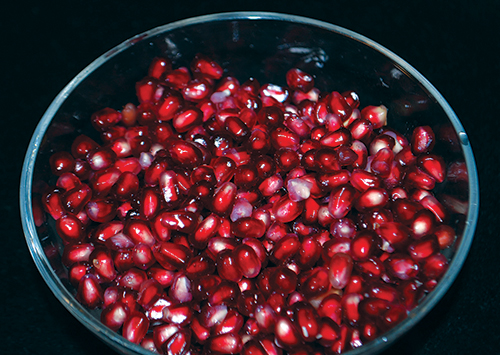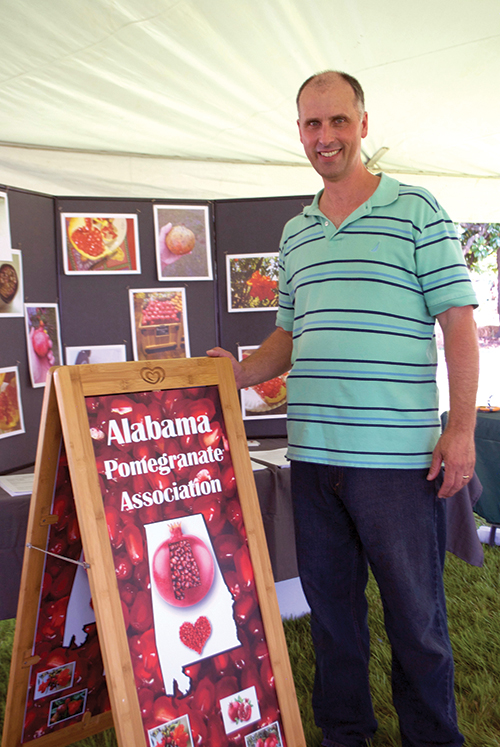 Alabama pomegranates: A past and future treasure
Alabama pomegranates: A past and future treasure
When Old World settlers arrived in Alabama several hundred years ago, many brought along the fruits from their homelands, including the fabled pomegranate. While those early settlers are long gone, many of those pomegranate trees, or at least their offspring, still remain in the state, and Shane Jennings of Baldwin County is on a mission to find these remnants of Alabama’s horticultural past and perhaps make them part of the state’s future.
Pomegranates (Punica granatum) are native to Iran and on into the Himalayas and India, but they have been cultivated across the globe for thousands of years and treasured for their flavor, nutritional and medicinal value and even their mystical properties. Today they are a venerated “super food,” and if Jennings has his way, they may soon become a prized agricultural crop for Alabama.
Jennings, an avid plant collector, discovered the potential of pomegranates a bit by accident when he set out to add a few pomegranates to his personal collection.

“Everything you hear and read about pomegranates talks about this one cultivar named ‘Wonderful,’” Jennings said. ‘Wonderful’ pomegranates are the ones we typically see in grocery stores, which have leathery, reddish rinds and medium-hard seeds encased in juicy, sweet-tart tasting arils.
While ‘Wonderful’ poms do have wonderful attributes, Jennings found that there are many other pomegranates available in a wide variety of colors, degrees of sweetness and even flavors, such as watermelon and lemonade. With some 500 varieties and cultivars to choose among, Jennings had a hard time picking which ones to buy, but he finally settled on six cultivars representing several different flavors.
He also began to learn more about pomegranates through a somewhat unexpected source — his day job running an ice cream delivery route. Lots of proprietors at the small convenience stores along Jennings’ route are immigrants hailing from countries where pomegranates are a dietary staple, and they were thrilled to learn he was growing one of their favorite fruits.
“Every one of them said they would love to buy pomegranates, but the ones in grocery stores don’t taste like the ones from their home countries,” Jennings says. “They told me, ‘If you will grow them, we will buy them.’”
So Jennings expanded his collection (he now has some 100 cultivars on his land in Robertsdale) and also began attending pomegranate grower meetings in Florida and Georgia. He soon realized that Alabama’s pomegranate potential was too great to keep to himself and he set out to spread the word about these amazing fruits (which are technically considered berries) by creating an Alabama Pomegranate Facebook page, an educational and networking resource for home gardeners and commercial growers alike.

He also founded the Alabama Pomegranate Association, an organization committed to promoting education, research and pomegranate varieties best suited for the state. The APA’s first annual meeting, open to both association members and non-members, will be Oct. 14, 9:30 a.m. to 3:30 p.m., at the Gulf Coast Research and Extension Center in Fairhope.
As he began to promote pomegranates at meetings and in chats with local residents on his route, Jennings discovered another source of pomegranate cultivars — heirloom pomegranate trees planted generations ago.
“People kept telling me that their granny had a pomegranate tree,” he says, and many of those people knew right where that tree was located. Though pomegranates are typically long-lived plants, some trees are 100 or more years old and have likely survived because they possess exceptional cold, disease and pest resistance specific to Alabama.
Jennings is collecting cuttings from these trees to root in hopes of preserving their genetic history and also using them in a breeding program to develop new, commercially viable pomegranate cultivars for Alabama’s growing conditions.
There is much work to be done before Alabama’s pomegranate potential is fully realized, but Jennings hopes that more and more people will get involved and make that happen. To report old trees or learn about growing pomegranates, check out the Facebook page (search Alabama Pomegranate Association) or alabamapomegranateassociation.com where you can register for the APA meeting. Or contact Jennings directly at (251) 725-2184 or [email protected]. He’s always happy to talk about pomegranates!
[list]
September Tips
- Remove dead plants and debris from landscape areas and garden beds.
- Compost that lawn and garden waste, along with organic kitchen waste.
- Plant fall and winter vegetables and root crops, perennials, biennials and spring-flowering bulbs.
- Fertilize azaleas and camellias.
- Continue to mow and irrigate lawns as needed and sow winter grass seed on bare areas.
- Divide and transplant perennials, irises and daylilies.
- Keep bird feeders and birdbaths clean and filled to attract resident and migratory birds this fall.
[/list]
 Katie Jackson is a freelance writer and editor based in Opelika, Alabama. Contact her at [email protected].
Katie Jackson is a freelance writer and editor based in Opelika, Alabama. Contact her at [email protected].




